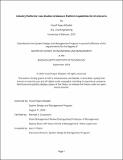Industry Platforms: Case Studies to Measure Platform Capabilities for US Unicorns
Author(s)
AlSadah, Yousif Fayez
DownloadThesis PDF (3.968Mb)
Advisor
Cusumano, Michael A.
Terms of use
Metadata
Show full item recordAbstract
Large-sample empirical research by Cusumano et. al. found that US privately-held unicorns with platform capabilities command on average 123% premium over non-platforms. However, measuring the extent to which a company is platform or non-platform based is a difficult problem given the complexities of business organizations and how these activities interact with each other in non-linear ways.
This thesis attempts to address this by proposing a systems thinking, case-based approach to evaluate the key business activities of a firm with potential platform capabilities using the author’s proposed Platform Classification Matrix on five of the largest US privately-held firms: Epic Games, Databricks, Plaid Technologies, Stripe, and Instacart. Each business activity for a firm is classified as platform or nonplatform, and if it is a platform then it is assessed based on its revenue contributions to the firm and three strength metrics: Network effects, strength against multihoming, and new entrant deterrence. This matrix generates a ‘platform strength’ metric and allows identification of the platform activity with the most potential towards a winner take all or most case.
The author further proposes combining this matrix with a system dynamic approach to identify how differing business activities can boost or hinder the leading platform service which allows decision makers to assess whether retaining or subsidizing seemingly low-performing business lines is strategic for their leading platform.
The thesis concludes by advocating for using both methods as well as the generated metrics to perform a holistic analysis when evaluating firms with platform capabilities potential.
Date issued
2023-09Department
System Design and Management Program.Publisher
Massachusetts Institute of Technology